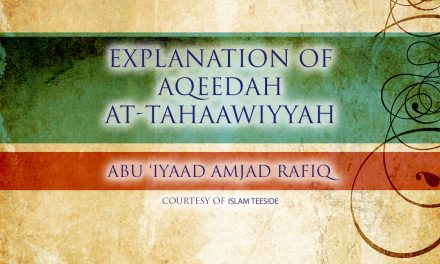Abu Humayd goes through the book al-mulakhas al-fiqhiyy (A Summary of Islamic Jurisprudence) by Shaykh Salih al-Fawzan.
Recorded at the Salafi Centre of Manchester
Lesson Notes
Lesson 1
Abu Humayd introduces the book al-mulakhas al-fiqhiyy (A Summary of Islamic Jurisprudence) by Shaykh Salih al-Fawzan.
Lesson 2
A Summary of Al Mulakhas Al Fiqhi – Lesson 01 (05/07/17)
In the first lesson of the Wednesday classes with Ustadh Abu Humayd hafidhahullaah, we began with the Book of Purification, the Chapter of Rulings of Purification and Water.
The contents of the lesson included:
• The meaning of Taharah both linguistically and legislatively.
• The 2 types of purification; spiritual and physical.
• The 2 types of water; Pure and Impure.
• Some details regarding water being mixed with pure and impure substances and the different positions towards them.
For a clear explanation and in depth discussion of all of these points and more, listen to the audio BaarakAllaahu feekum.
Lesson 3
Interactive lesson starting with a recap of the last lesson to aid understanding. See the post on learnaboutislam.co.uk for a diagram summarising the full topic.
We covered a number of fataawa from the fataawa of Shaykh Ibn Uthaymeen from “Noor ala darb” related to the “chapter of purification and water”.
Lesson 4
In Lesson 4 of this series we began with the Chapter: “Disbelievers’ Pots & Clothes”.
This chapter included a discussion on the following:
• The Rulings on Vessels, whether from gold, silver or otherwise.
• The Ruling on using gold and silver generally.
• The Rulings on the Hides of Animals, whether they be edible animals or inedible animals.
• The Rulings on the clothes of the disbelievers.
See the post on learnaboutislam.co.uk for a diagram summarising the full topic and for more details on the above, listen to the audio BaarakAllaahu feekum.
Lesson 5
Chapter: Things Ritual Impurity Prohibits Doing
Is it permitted to touch the mushaf without wudhoo?
Can you recite the Qur’an without wudhoo?
What are the things that are impermissible for the person upon minor impurity?
What are the things that are impermissible for the person upon major impurity?
Lesson 6
In Lesson 6 of this series we began with the Chapter: “Etiquettes of Answering Call of Nature”.
We did not complete the chapter in this lesson, but our lesson included a discussion on the following:
• The complete nature of the religion of Islaam.
• Supplications to be made
o What are the established supplications?
o When are they to be made?
o Do they need to be made when entering the bathroom for another need, not intending to relieve oneself?
• How to enter and exit the bathroom
• The issue of facing the qiblah or facing away from it, and the different opinions related to it.
• Taking items with the remembrance of Allaah on them into the bathroom, is it allowed or not?
• Speaking whilst in the bathroom
• Istinjaa and Istijmaar
See the post on learnaboutislam.co.uk for a diagram summarising the full topic and for more details on the above, listen to the audio BaarakAllaahu feekum.
Lesson 7
What is Istinjaa? What is Istijmaar? What is the difference between the two? We discuss the positions of the scholars on this and the ruling on facing the qibla
Lesson 8
What is the ruling on the Siwaak?
When should you use the Siwaak?
Should you use the right or left hand?
Is there a recommended length the Siwak should be?
Lesson 9
The Messenger of Allah said,
“The Fitrah is 5.”
1. Circumcision
2. Shaving private areas
3. Trimming Moustache
4. Clipping Nails
5. Removing Hair from the Armpits (Sahih Muslim).
• With regards, these affairs, excluding circumcision, a person should not go beyond 40 days, without fulfilling; excluding the trimming of the moustache for the woman. If goes beyond 40 days then the scholars say this is opposing the sunnah (if a person forgot or was lazy) and a person may fall into haram if he or she were resembling the non-Muslims, for e.g. men or women growing their nails in resemblance to non-Muslims.
• Plucking of the Eyebrows is not allowed, rather it is forbidden and is from the Major Sins.
• Proof it is from the Major Sins is the fact there is a mention of L’an (curse) in the hadeeth, as the scholars have explained.
• There are certain exceptions to the plucking of an eyebrow IF there was a need; for e.g. if instead of two they join to form one eyebrow. (Unibrow)
• Shaving part of the hair and leaves part.
• Not obligatory to circumcise females, rather it is recommended, not correct to force and more so if it leads to harm, in this case would be haram and waajib to refrain.
Lesson 10
The Messenger of Allah said,
“The Fitrah is 5.”
1. Circumcision
2. Shaving private areas
3. Trimming Moustache
4. Clipping Nails
5. Removing Hair from the Armpits (Sahih Muslim).
Each of the 5 was explained in detail along with related issues.
Lesson 11
In today’s lesson, we continue with the Chapter of Ablution, starting with the obligatory acts:
The Obligatory Acts of Ablution
1. Washing the whole face (including the rinsing of the mouth and the nose)
2. Washing the forearms including the elbows (& including the hands)
3. Wiping over the whole head (including the ears)
4. Washing the feet (including the ankles)
5. Sequence (of the wudhu in the previously mentioned order) *Difference of opinion*
6. Succession (without any interval between washing two organs). In a timely manner, without a pause in between as much as possible.
The scholars disagree whether starting with the Tasmiyah (saying Bismillah) is obligatory or an act of sunnah. Either way it is permissible according to all scholars to start with the Tasmiyah so it should not be abandoned.
* Shayhk Ibn Baz & Shayhk Uthaymeen mention the sequence of the ablution mentioned earlier as obligatory. Shayhk Albanee mentions that it is not obligatory.
For a more in depth discussion of every mentioned above, listen to the audio, BaarakAllaahu Feekum.
Lesson 12
Summary of Islamic Fiqh
In today’s lesson we looked at the acts of Sunnah to be observed during the Ablution. They are the following:
1. Using the Siwaak (tooth-stick) during ablution.
2. Starting the Ablution with washing the hands three times (before the obligatory washing of the face).
3. Starting with rinsing the mouth and the nose (before the obligatory washing of the face).
4. Inserting one’s wet fingers into one’s (thick) beard)
5. Starting with the right orphans before the left (as in washing the hands and the feet).
6. Washing the face, hands and feet up to three times instead of once
Lesson 13
Having completed the conditions, obligations and sunnan of Wudhoo, the Shaykh begins to explain the detailed manner of performing the wudhoo, which is as follows:
1) An-Niyah – Intention
2) Tasmiyah – To begin with the Name of Allah
3) To wash the hands three times
The Scholars say not to use soap during wudhoo unless there is a need, as water is a purifier. To constantly use soap when performing wudhoo is going into extremes and The Messenger of Allah Salallahu Alayhi Wasallam said: “Destroyed are those who go to extremes”.
4) To rinse the mouth three times and then the nose three times. Shaykh Uthaymeen said it is also allowed to get more water for rinsing the nose, after the water has gone into the mouth. Then left hand is used to take water out from nose.
5) To wash the face three times.
6) To wash the hands up to the elbows three times.
The ruling on washing over fake finger nails: It is haram to use finger nails, we have been commanded to clip the nails, and these nails are in clear opposition to the fitrah.
However, the Committee of Major Scholars said if there is a need, for example, a woman has lost a fingernail or it cracked, it is allowed for her to have a fake finger nail; however, when washing the hands, she must remove the fingernail.
Must nail varnish be removed for wudhoo? If it forms a barrier, and water doesn’t reach it, then it is obligatory to remove it. As for henna, it does not form mass and it does not have to be removed.
7) To wipe over the whole head, only once, including the ears. Wiping over the head is done by placing wet hands on the upper part of the forehead and letting them pass backwards until they reach the back of the head. This is obligatory. Bringing them back a second time to the original starting point of the upper forehead is sunnah, as mentioned by Shaykh Uthaymeen. Then he enters his index fingers into his earhole, then he wipes the outer ears with his thumbs.
In all of these affairs, the men and the women are equal and the same, except for that in which there is a proof for. So the woman will also wash starting from where her head begins, up to where the hair on her head ends (i.e. the back of the neck, not where her hair ends).
8) Wash the feet three times, including the ankles. As for the one who is amputated, losing a foot or an arm, this individual washes that which remains. Shaykh Uthaymeen said if a person’s whole leg has been lost, the obligation of washing the foot is lifted upon that person due to the statement of Allaah:
“So keep your duty to Allah and fear Him as much as you can” (64:16)
If a person has no hands to make ablution, it is obligatory upon a Muslim to help them.
9) After finishing ablution, an authentic narration that can be uttered is:
أَشْهَدُ أَنْ لَا إِلَهَ إلَّا اللهُ وَحْدَهُ لَا شَرِيكَ لَهُ، وَأَشْهَدُ أَنَّ مُحَمَّداً عَبْدُهُ وَرَسُولُهُ
‘Ash-hadu ‘an laa ‘ilaaha ‘illallaahu wahdahu laa shareeka lahu wa ‘ash-hadu ‘anna Muhammadan ‘abduhu wa Rasooluhu
I bear witness that none has the right to be worshipped but Allah alone, Who has no partner; and I bear witness that Muhammad is His slave and His Messenger. (Muslim 1/209)
For more details of this lesson, visit learnaboutislam.co.uk.
Lesson 14
The talk begins with a recap of the manner of making wudhoo, and the dua made after completing wudhoo.
The relevance of making supplication after wudhoo is to combine both physical and spiritual purity.
It is permissible to dry the body parts washed for wudhoo with a towel or through other means. Shaykh Uthaymeen says the proof of the permissibility of drying oneself is the absence of a proof prohibiting it.
Every Muslim must know that every body part which is prescribed to be washed in wudhoo, must be washed thoroughly.
The Prophet Sallallaahu Alayhi Wa Sallam said: “Woe to the heels (which are not washed) in the fire”.
The perfection of wudhoo is not to use excessive water, rather it is to ensure water reaches all parts of the organ being washed without being excessive and wasting water.
Excessiveness use of water has detestable consequences such as:
1. Incomplete purification
2. Excessive in worship
3. Insinuation in purification
Lesson 15
In this lesson, Abu Humayd discusses the permissibility of wiping over the khuffs (socks). One of the reasons wiping over the khuffs is allowed when performing ablution is due to the difficulty in constantly removing the socks.
There are many narrations supporting the authenticity of wiping over the khuffs.
Al-Hasan said: “I was told by seventy companions of Allaah’s Messenger (Salallaahu Alayhi Wa Sallam) that he used to wipe over his khuffs.” (Ibnul-Mundhir’s Al-Awsat [1/430, 433])
It was narrated by Imaam Ahmad: “There is not a shadow of doubt in my mind concerning the legality of wiping over the khuffs, as there are forty hadiths of the Prophet (Salallaahu Alayhi Wa Sallam) indicating its permissibility”. (Al-I’lam Befawa’id Umdat Al-Ahkam [1/165])
There are many more benefits discussed, such as whether wiping over the khuffs during ablution, and then removing them breaks a person’s wudhoo.
Lesson 16
In this lesson, Abu Humayd Saalim discusses the issue of wiping over the turban.
Wiping over the turban is allowed under two conditions:
1) The turban must be covering the area of the head which is traditionally covered.
2) The turban must be wrapped round the lower jaw up to the head, one or more than one turn, or to be with a back tail.
The permissibility of wiping over the turban in ablution is stated in many ahadith that the Prophet Salallaahu Alayhi Wa Sallam wiped over his head during ablution. To illustrate, ‘Umar Ibnul-khattab (may Allaah be pleased with him) said:
“He who is not purified by wiping over the turban (i.e does not deem it sufficient for wiping over the head), then may Allaah not purify him”.
The talk also covers the issue of wiping over the shoes. For more detailed notes and to benefit from the
Lesson 18
The things nullifying the ablution are three:
1) Whatever comes out of the stool and urine exits, such as stool wind, urine, sperm, pre-seminal fluid, and unusual menstrual blood. Stool and urine are among the direct things nullifying ablution, as when Allaah, Exalted be He, revealed the cases that obligate ablution He said: “Or one of you comes from the place of relieving himself…” (Al-Maida: 6)
As for sperm and pre-seminal fluid, they nullify ablution according to the authentic hadiths reported by Ibnul-Mundhir and Al-Awsat [1/134].
Lesson 19
Today’s lesson was a continuation of the chapter “Things Nullifying Ablution”. Shaykh Al Fawzaan made mention of some matters that the scholars have differed concerning. Ustadh Abu Humayd took each point and went into detail bringing the speech of the scholars and the varying opinions associated to them. The matters that were discussed are:
1. Touching the penis
2. Touching a woman lustfully
3. Washing the body of the deceased person
4. Apostasy
The Shaykh summarised all these matters by stating that there is a difference, and to reperform wudhu to get out of the differing is better.
In the next lesson, we will discuss the issue of “Certainty and Doubt” as it relates to being in a state of wudhu or not, in Shaa Allaah.
Lesson 20
In this lesson we continue with the class on Islamic Jurisprudence, completing the chapter on nullifiers of ablution.
Covered in this lesson:
• Doubts concerning the validity of one’s wudhu and what one should do in this situation.
• Principle regarding certainty and doubt.
• What to do when we doubt whether we have prayed.
Various Principles of Usool al-Fiqh are discussed in this lesson; from them:
اليقين لا يزول بالشك
Certainty is not removed by doubt.
Lesson 21
It is now known the rulings with regards to purifying oneself, whether that be as a result of minor or major impurity.
The shaykh mentions that ghusl is to apply water to the whole of the body, in a specific way; and its explanation is to come.
It is said that bathing rituals were from the times of pre-Islamic ignorance, and they had remnants from the religion of Ibrahim Alayhi Salam, and this act was from those remnants.
The origin of the word ‘impure’ in Arabic is to be far away.
There are six cases in which ritual bathing is obligatory; in this lesson, 2 of them are discussed:
1) ejaculation, whilst asleep (also known as wet dreaming) or awake.
2) Inserting a man’s penis into a woman’s vulva, even if there is no ejaculation.
Lesson 22
Please listen to the full talk for more benefits Baarakallaahu Feekum.
Lesson 23
📕A Summary of Islamic Fiqh
We continue with the topic of Ghusl (ritual bath).
The way a complete ritual bath is taken is as follows:
– Having the intention to to take a ritual bath (This is the first pillar of Ghusl)
– Beginning with Tasmiyah (Saying Bismillah)
– Washing one’s hands thrice
– Washing one’s genital
– Performing full ablution
– Washing one’s head; pouring over the head thrice so that it thoroughly reaches one’s scalp
– Pouring water over one’s whole body and rubbing with one’s hands, making sure that water reaches all parts of the body.
Ghusl has two pillars: 1) the intention
2) to wash the whole of the body.
If these two are done, then the Ghusl is sufficed.
This lesson also recaps the pillars of wudhoo, and the sunnah acts of it.
The menstruating woman or the woman in a state of postnatal bleeding has to undo her hair braids or pigtails when taking a ritual bath. However, a woman in a state of janabah does not have to undo her hair braids to have a ritual bath, as it does not affect the validity of her ritual bathing in this case. This is because janabah is a frequent state, and undoing her hair braids every now and then might cause her difficulty. Still, it is obligatory for a woman in that state (of janabah) to make water reach her scalp.
For detailed discussions of all of this, listen to the audio. BaarakAllaahu Feekum.
Lesson 24
In this lesson, the topic of Tayammum is discussed. Ustaadh Abu Humayd discusses the definition of the word ‘tayammum’, as is shown in the Quran, the permissibility of it, the occasions in which it is allowed, what a person should do if they are praying as a result of performing tayammum and then find water, and much more.
Please listen to the full audio for further benefits Baarakallaahu Feekum.
Lesson 25
Abu Humayd continues on the topic of tayammum and discusses many key topics; from them are:
– when tayammum is able to be used as a substitute for water and the evidence to support this statement
– the things that nullify tayammum
– the method of performing tayammum
Many more important topics are also discussed, such as what to do if one has prayed in a state of tayammum due to having no water available, and then later the individual finds water.
For detailed benefits please listen to the full talk Baarakallaahu Feekum.
Lesson 26
This lesson covers:
– The importance of removing impurity
– Whether impurity can only be removed through water
– Whether it is permissible to pray in clothes with blood stains on
And much more. Please listen to the full lecture for more benefits Baarakallaahu Feekum.
Lesson 27
This lesson covers:
– The importance of removing impurity
– Whether impurity can only be removed through water
– Whether it is permissible to pray in clothes with blood stains on
And much more. Please listen to the full lecture for more benefits Baarakallaahu Feekum.
Lesson 28
We arrive at the chapter concerning the ruling of menstruation and post-natal bleeding. Allaah says: “They ask you concerning menstruation. Say: that is an Adha, therefore keep away from women during menses and go not unto them till they are purified. And when they have purified themselves, then go in unto them as Allâh has ordained for you. (2: 222)
Abu Humayd discusses the minimum and maximum ages at which a woman can menstruate, the minimum and maximum length of time a woman can menstruate for, and much more. Please listen to the full talk for detailed benefits.
Lesson 29
In this lesson, Ustaadh Abu Humayd continues with the topic of menstruation; discussing many important topics:
– What good deeds the menstruating woman needs to refrain from
– The good deeds a menstruating woman would need to make up
– The four signs of menstrual blood
– The two signs of a woman purifying
And much more. Please listen to the full talk for detailed benefits.
Lesson 30
In this lesson Ustaadh Abu Humayd covers the four signs of menstrual blood, the two signs of a woman purifying, the rulings regarding prayer after a woman purifies, and more.
Please listen to the full talk for further benefits.
Lesson 31
Continuing with the chapter on menstruation and postnatal bleeding, Ustaadh Abu Humayd moves onto the subject of continuous bleeding.
Topics include:
– The six distinguishing features between menstrual bleeding and other continuous bleeding, as mentioned by Shaykhul-Islam Ibn Taymiyah (may Allaah have mercy upon him)
– The cases in which a woman cannot distinguish between normal continuous bleeding and menstrual bleeding
– Obligatory acts to be observed by a woman who sees continuous bleeding in case she is deemed to be ritually pure
and more; please listen to the full talk for detailed benefits Baarakallaahu Feekum.








